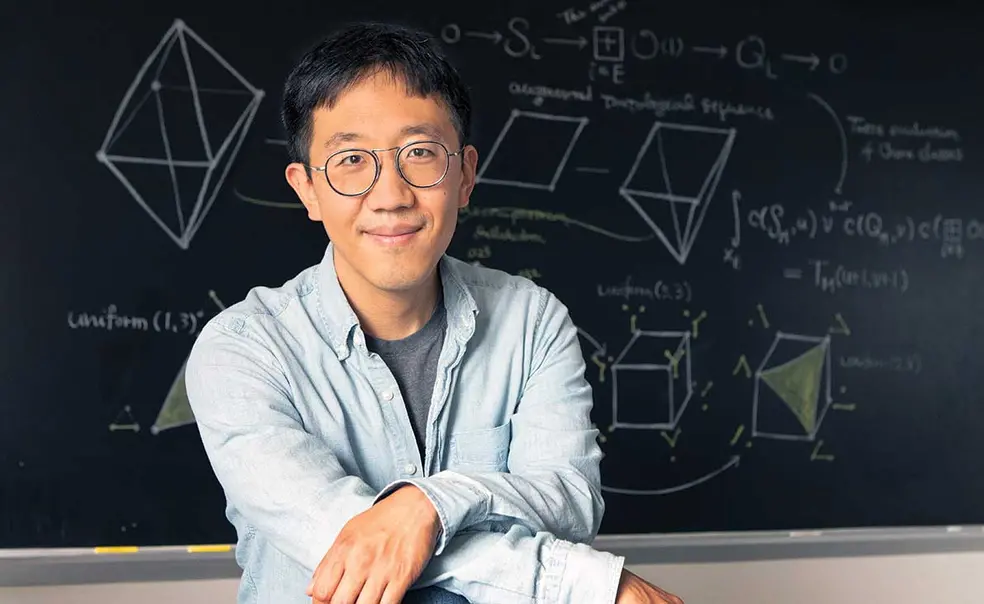June Huh’s Fields Medal Leads Princeton’s Mathematics Awards
As a student in South Korea, June Huh envisioned a future as a poet or science journalist, according to profiles in The New York Times and Quanta Magazine. But in his final year of college, he took a course in algebraic geometry, taught by 1970 Fields Medalist Heisuke Hironaka. Working through proofs with Hironaka realigned Huh’s trajectory toward a career in mathematics.
In July, a decade and a half after taking that class and a year after becoming a Princeton professor, the 39-year-old Huh was one of four mathematicians to earn the 2022 Fields Medal from the International Mathematical Union (IMU). Often called “the Nobel Prize of mathematics,” the award is presented every four years and honors mathematicians under age 40 for “outstanding mathematical achievement for existing work and for the promise of future achievement.” Huh is best known for his work in geometric combinatorics. In a video produced by the Simons Foundation, he explains the field as building spaces and using “geometric intuition to extract information.”

Huh, who declined an interview request from PAW, has perhaps the least traditional career path of this year’s Fields recipients. He was not a child prodigy — in fact, he told the Times that his math grades were “notably mediocre” compared to his grades in other subjects. On Hironaka’s recommendation, he returned to the United States in 2009 to continue his graduate work (he was born in California while his parents were grad students). He turned heads with his initial work at the University of Illinois and completed his Ph.D. at the University of Michigan. He served as a fellow and visiting professor at Princeton and the Institute for Advanced Study before joining the University faculty full time.
Huh is the ninth Princeton professor to win the Fields Medal and the first since 2014, when Manjul Bhargava *01 received the award. Alumnus Akshay Venkatesh *02, a professor at the Institute for Advanced Study and visiting lecturer at Princeton, won the prize in 2018.
The Fields announcement was made at the IMU Award Ceremony July 5, where Princetonians won three other major awards. Physicist Elliott Lieb received the Gauss Prize for his mathematic contributions to multiple fields, including quantum mechanics, statistical mechanics, computational chemistry, and quantum information theory. Computer scientist Mark Braverman earned the Abacus Medal for his research on information complexity and communication protocols. And alumnus Barry Mazur *59, a professor at Harvard, was honored with the Chern Medal, a lifetime achievement award, “for his profound discoveries in topology, arithmetic geometry and number theory, and his leadership and generosity in forming the next generation of mathematicians,” according to the citation.
Earlier in the year, Princeton professor Noga Alon shared the $1.2 million Shaw Prize in Mathematical Sciences, which recognizes breakthroughs and career achievements, with Ehud Hrushovski, a professor at the University of Oxford who was a Princeton instructor and visiting assistant professor in the 1980s. The Shaw Prize Foundation credited the two researchers “for their remarkable contributions to discrete mathematics and model theory with interaction notably with algebraic geometry, topology and computer sciences.”
Since 2004, the Shaw Prizes have annually honored laureates in three areas: astronomy, mathematical sciences, and life science and medicine. Past winners of the math prize include Princeton professors János Kollár (2017) and Andrew Wiles (2005).












1 Response
Martin Scharlemann ’69
3 Years AgoAbel Prize-winner Dennis Sullivan *66
Thank you for the September article (On the Campus) on June Huh, a fresh young faculty member who has just been awarded a Fields Medal, said to be equivalent in mathematics to the Nobel Prize. It is wonderful to see that Princeton remains a vibrant center of mathematics research.
The article names other top mathematicians with Princeton connections who have won prestigious prizes this year. An important omission in this list was Dennis Sullivan *66, who in March 2022 won the Abel Prize, also bracketed with the Nobel. You can read about other Princetonians who have won the Abel Prize in PAW’s March 23, 2011, issue and about Sullivan’s award at abelprize.no.
Dennis Sullivan’s Princeton connection was brief, but for this undergraduate it was life-altering. Following his Princeton Ph.D., Sullivan taught a small course in multivariable calculus. It was the most exciting course I took at Princeton, sweeping me into mathematics, first as a major and then as a career. It was Sullivan’s now-famous charisma that brought me into the field, a decision that I’ve never regretted. It seems a shame that his connection to Princeton should have gone unnoticed as he receives such a prestigious award.
In any case, it is a great pleasure to see that Princeton continues to recruit young mathematical stars like Professor Huh. I wish him the best, both in his research and in the classroom.
Editor’s note: The author is a distinguished professor emeritus at the University of California at Santa Barbara.